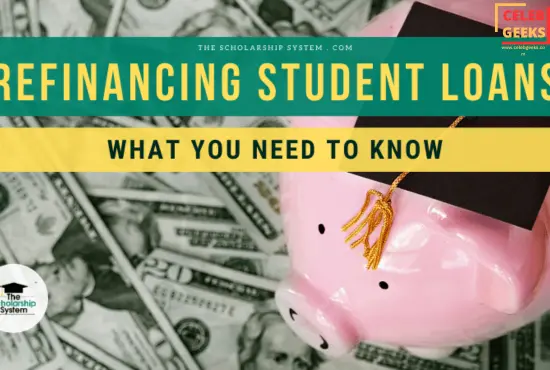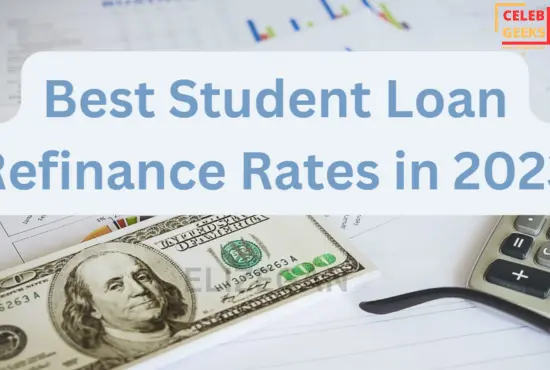Student loan refinancing can be a great way to save big under the right circumstances. A new private company—a company that’s often a bank, credit union, or even an online lender—would pay off the student loans you choose to refinance and issue you a new loan with a new interest rate.
Refinancing is the process of using a new private student loan to pay for one or more existing loans. Borrowers do this usually to reduce the interest rate, either to have lower monthly payments or repayment in general.
Refinancing student loans can save you money when repaying them, though not a good strategy for everyone. At least not for those with federal student loans eligible for some of the neat debt-forgiveness programs and income-driven plans for repayment. But when you have private student loans or you couldn’t possibly take advantage of such federal protections available, you may then have determined that refinancing is right for your financial situation.
Benefits of Student Loan Refinancing

Lower Interest Rates
The most alluring benefit of refinancing is that it may result in a lower interest rate. Normally, those good credit scorers with a stable income qualify for a rate that will be lower than the rate of their existing loans. Saving the massive amounts on interest cuts among borrowers, particularly those who have large student debts, is possible.
As an illustration, saving $50,000 in loan interest over its life may result from lowering the interest rate on a loan from 7% to 4%. This would particularly make refinancing very attractive for private loan holders since interest rates are higher compared to those on federal loans.
Simplified Repayment
Refinancing enables the borrower to collect all loans under a single payable loan, making a monthly payment instead. It helps make it easier for the repayment of loans to be made on time, meaning the possibility of missing payments that can damage credit scores becomes smaller. Instead of tracking multiple due dates and different amounts to be paid, one can focus mainly on a monthly payment.
Flexible Loan Terms
Refinancing allows the borrower to choose a new repayment term the term will normally be 5 to 20 years. This is with enough flexibility for an option in the term such that he or she determines a term that will surely match his or her desire in financial terms. A person who would want to clear the loan faster would opt for a short term, whereas one in need of a lower monthly refund, a longer repayment term.
Opportunity to Release Cosigners
Many student loans, especially private student loans, require the application of a cosigner. It is typically a parent or another adult living with the student to secure better terms. Several lenders also offer cosigner-release refinancing options whereby the borrower can assume full responsibility for the loan which will free his cosigner from any monetary liability on the loan.
Disadvantages of Student Loan Refinancing

There are a lot of advantages to refinancing, but there can be some downsides as well.
Loss of Federal Loan Benefits
Refinancing federal student loans has two main drawbacks. One of the most critical ones is that they are typically denied the benefit of all the federal protections and benefits. Federal loans come with some repayment plans, including income-driven ones where the borrower’s monthly payment will be adjusted based on his income. The federal loans also provide the benefit of giving borrowers the option to put in applications for deferment and forbearance, through which they could temporarily halt payments during periods considered financially troubled.
These borrowers are no longer eligible to enjoy those benefits by refinancing the federal loans by a private lender. It may become quite risky for consumers as they might require income-driven repayment or forbearance in the future.
Credit Requirements
Most probably the refinancing lender would demand a good credit score and steady income to give access to the most favorable interest rates. Borrowers with a poor or limited credit history don’t stand a good chance of qualifying for good interest rates. Even finding themselves barely offered anything better in exchange for refinancing.
Potential for Higher Total Costs
Refinancing might cut back on the monthly payments but at the cost of taking an elongated period to pay back. So, borrowing at a little higher interest rate may cost more absolutely over the lifetime of the loan. A car borrower who finances it for 10 years rather than 20 years will end up paying less money every month but more in the absolute number in terms of interest paid.
Eligibility for Loan Refinancing

Eligibility to refinance student loans largely depends on the creditworthiness and the financial health of the borrower. Such factors include the credit score, income, and ratio of debt to income of the borrower. For the larger part, lenders take into account the following factors:
Credit Score:
Normally, most lenders would insist that the credit score should at least be 650-700, though scoring above 700 would have a very good chance of obtaining the best interest rates.
Income:
A borrower should be able to demonstrate a steady source of income or employment to prove that he or she can pay back the loan. Some of them require an annual income minimum.
Debt-to-Income Ratio:
The loan may also be analyzed through the lens of how much debt the borrower has compared to income. If the debt-to-income ratio is smaller, the financial health is at a better stage and, as such, the chances of landing more favorable terms are higher.
Some lenders offer refinancing options for borrowers with lower credit scores, but these may come with higher interest rates or require a cosigner.
How to Refinance a Student Loan
Loan refinancing includes the following steps:
Research Lenders
This can be achieved by carrying out preliminary research on which refinancing lenders have favorable interest rates, repayment terms, and other qualifying requirements. Since each lender is unique, it would be prudent to do a bit of shopping around to get the best deal. Many lenders also offer prequalification tools that allow borrowers to check their qualifications for refinancing and which interest rates they qualify for without affecting their credit score.
Gather Documentation
To be able to apply for refinancing, borrowers normally need to provide these documents:
- Proof of income, such as a pay stub or tax returns
- Existing loan statements of the lenders
- Government-issued Identification.
- Graduation proof from a recognized institution
Apply for Prequalification
There are usually pre-qualification options available on many lenders’ websites and, very often, borrowers get free offers with the potential rates of interest and loan terms; no credit score is affected by them. Comparing the offers from various lenders often makes use of pre-qualification.
Submit an Official Application
Once you have selected your lender, apply to refinance. Lenders run a credit check and review your credit profile to make their decision final for refinancing purposes. Once you accept an offer, the new lender will pay out your existing loans and you begin repaying the new lender.
Student loan refinancing rates

The student loan refinancing rates is the interest rate on a new loan paying off one or more existing student loans. This may be fixed or variable:
Fixed rates
These rates are fixed within the life of the loan and, therefore, do not change, predictable monthly payments.
Variable-rate
Payments fluctuate with the market, so on your standard loan your payments could fluctuate with broader interest rate trends.
Refinance rates can depend on private lenders because the general rule of federal loan programs is that refinancing is not offered, though this does vary depending on the loan. The individual borrower will be quoted at different rates as well, depending on credit score, income, and the amount to be refinanced.
Factors affecting student loan refinancing rates
Major factors determine the interest rates lenders offer in refinance packages:
Credit Score
One of the largest factors used in determining your rate on your refinance is actually how good your credit score is. So if you happen to be one of those consumers, normally with better than excellent credit scores, about 700 and above, you are more likely to get the best refinancing rates. If one has lower credit scores, he might have higher rates, or he wouldn’t even qualify to refinance.
Income
The lenders, again, consider your income to ascertain whether you can afford the repayment of the loan. A high income would qualify you for better rates. Whereas some refinancers do give a minimum income for refinancing.
Debt-to-Income Ratio
The debt-to-income ratio refers to the number of monthly dollars spent to pay the debt. Lenders in general see that the smaller the DTI is, the better you are controlling your debt and can afford more loans, which can result in better rates. The minimum ratio, according to Fannie Mae’s underwriting guidelines, should be below 40 percent.
Loan Amount
The size of the amount refinanced also tends to determine the rate. A large loan size means a larger negotiating room for you, whereby you may be able to negotiate a lower rate. But that is not guaranteed. Instead, the lenders will proceed to study the total risk profile involved in your loan.
Loan Term
The term of which you choose to pay impacts your interest rate. Loan terms with the shortest duration in terms of 5 years. For example, a lower rate but monthly payments are very high. The longer loan-that is, a 20-year long, for example-payments are not that high, but the rate is usually higher. You pay the interest at the end of the term.
Lender
The people offering the loans vary in their price, which yet again depends on the risk models, customer base, and market conditions. It is therefore essential that one shops around and compares the rates from various lenders before committing to anything.
Frequently Asked Questions
What is student loan refinancing?
It replaces an existing loan with a new one that usually offers a lower interest rate by a private lender to allow an individual to simplify payments or reduce costs.
Who is eligible for loan refinancing?
Refinancing your student loan requires a good credit score, stable income, and the lowest debt-to-income ratio, to refinance from a borrower.
Does refinancing federal student loans eliminate federal protections?
Refinancing federal loans with a private lender removes access to the benefits associated with federal loans, such as income-driven repayment plans and loan forgiveness.
Can I refinance both federal and private student loans?
Yes, refinancing can consolidate both federal and private loans into a new loan using one private lender.
Will applying for refinancing affect my credit score?
Yes, refinancing typically involves a credit check, so it will temporarily lower your credit score. Pre-qualifying often uses a soft credit check.
